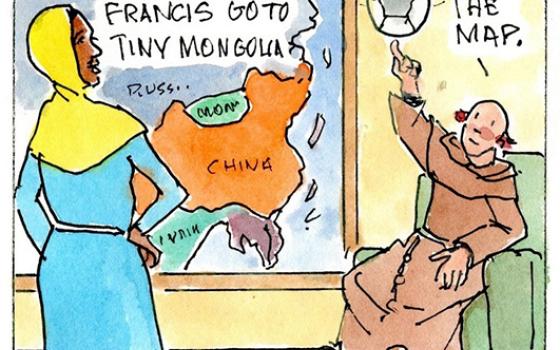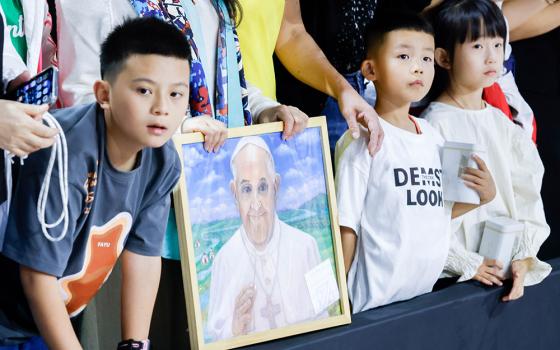Pope Francis stands next to Mongolian President Ukhnaagiin Khürelsükh in front of a statue of Genghis Khan during an official welcome ceremony in Sükhbaatar Square in Ulaanbaatar, Mongolia, Sept. 2. (CNS/Lola Gomez)
With one neighboring country actively waging war and the other becoming an increasingly totalitarian state, Pope Francis on Sept. 2 praised Mongolia's commitment to charting a different course through democracy and diplomacy in pursuit of peace.
"Mongolia is a democratic nation that pursues a peaceful foreign policy, but also proposes to play an important role on behalf of world peace," the pope said in his first official remarks since arriving here in the country on Sept. 1.
While the Vatican has always insisted that the primary purpose of the Francis' visit Mongolia was to encourage one of the world's smallest and newest Catholic communities, its strategic location as a landlocked country that shares a nearly 3,000-mile border with China and a 2,100-mile border with Russia — two countries that have never been visited by a pope — was an obvious motivation for the 86-year-old pope.
And in his address to the country's political and civil leaders, Francis appealed to Mongolia's own storied history where for nearly two centuries under the Mongol Empire there was relative peace that stretched from China’s Pacific coast to Eastern Europe, following the death of the country's revered 13th century founder, Genghis Khan.
'Governments and secular institutions have nothing to fear from the church’s work of evangelization, for she has no political agenda to advance.'
—Pope Francis
"May Heaven grant that today, on this earth devastated by countless conflicts, there be a renewal, respectful of international laws, of the conditions of what was once the pax mongolica, that is, the absence of conflicts," said the pope.
The pope went on to quote from one of the country's well-known proverbs: "The clouds pass away, but the sky remains."
"May the dark clouds of war be dispelled, swept away by the firm desire for a universal fraternity wherein tensions are resolved through encounter and dialogue, and the fundamental rights of all people are guaranteed," said the pope. "Here, in this country so rich in history and open to the sky, let us implore this gift from on high, and together let us strive to build a future of peace."
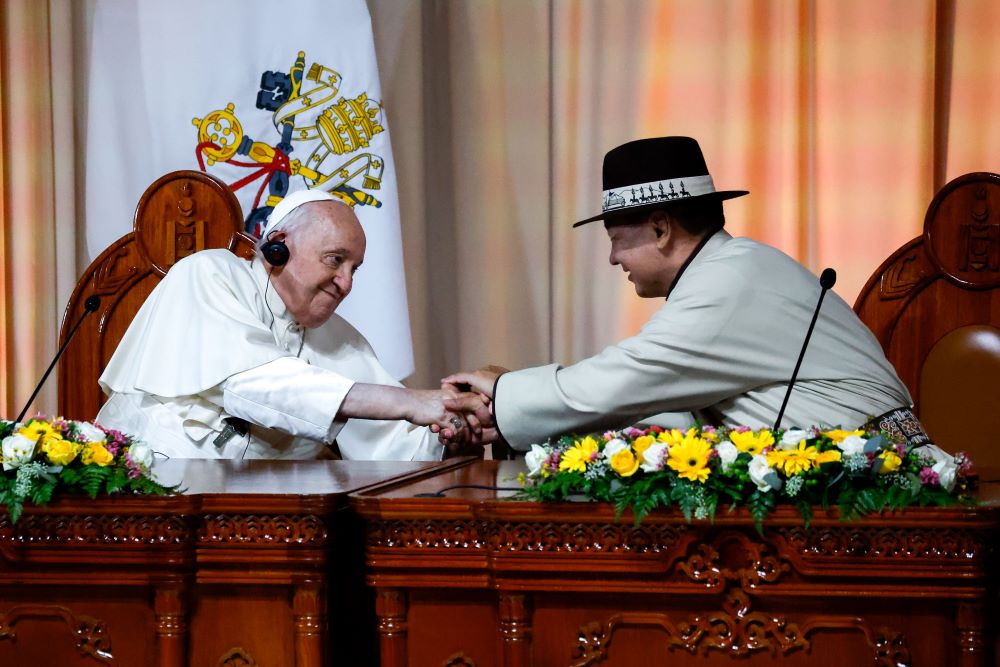
Pope Francis shakes hands with Mongolian President Ukhnaagiin Khürelsükh during a meeting with government and political leaders, diplomats and representatives of civil society in the Ikh Mongol Hall of the State Palace in Ulaanbaatar, Mongolia, Sept. 2. (CNS/Lola Gomez)
Mongolia's President Ukhnaagiin Khürelsükh, leader of the only democracy in the region — and one that has continued to maintain strong ties with both Russia and China — told the pope that he hoped his country would be able to contribute to peace, both globally and locally, saying it "has been offering its initiatives and actively engaging with our immediate and third neighbors."
During his address at Mongolia's State Palace, the pope also lauded the country's commitments to religious freedom, non-proliferation of nuclear weapons and its abolition of the death penalty in 2016, as well the longstanding commitment of the country's Shamanistic and Buddhist peoples for caring for the environment.
Care for creation, the pope said, is "urgent" and "no longer deferrable" — in a likely nod to the fact that Ulaanbaatar is one of the most polluted capitals in the world.
The pope began his first full day here in the Mongolian capital with an official welcome outside the official government palace in a ceremony with more than two dozen armored Mongolian soldiers on horseback.
Francis was seated next to President Khürelsükh under the shadow of a large-scale statue of Genghis Khan, who is renowned for amassing the largest contiguous land empire in history.
Although Francis is one of the world's most recognized leaders, only a few hundred onlookers gathered outside of the State Palace to get a glimpse of the pope. His visit barely disrupted the city center, marking a stark contrast from many papal visits that can shut down entire cities.
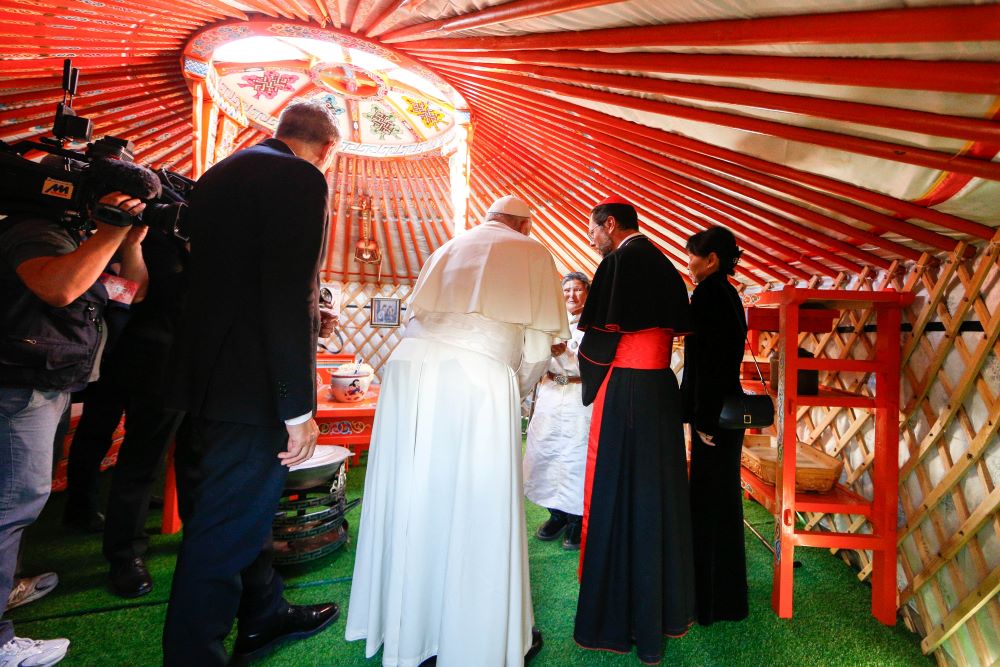
Pope Francis meets Tsetsege in a ger outside Sts. Peter and Paul Cathedral in Ulaanbaatar, Mongolia, Sept. 2. The Mongolian woman, who uses only one name, found a statue of Mary in a garbage landfill and gave it to missionaries; it is now venerated in the cathedral as Our Lady of Heaven. (CNS/Lola Gomez)
Among those gathered was 25-year-old Rouhi Pitre from North Carolina who happened to hear that the pope was in town.
"I'm not Catholic, and I don't know much about him really, but it's impressive that he's coming here all the way from Mongolia," she said.
But while Pitre's arrival in Sükhbaatar Square may have been accidental, 66-year-old Amy Chen traveled from Hong Kong with a group of 30 Catholics to support the pope's outreach to the Asian continent, and, specifically, to China.
Chen told NCR that she hopes the Chinese government — which continues to persecute religious believers — "sees the sincerity of the pope's visit" to Mongolia.
"He's talking about life, caring for others, caring for the poor," she said. "On this point, there should be no contradiction with the government."
Chen said she hopes the aftereffects of the pope's visit to Mongolia would be for China to "open the doors wide to Christianity and maybe the pope."
Advertisement
On the ground in Mongolia, however, the challenges of a more open China was underscored by the presence of a delegation of mainland Catholics who had traveled here clandestinely despite an official prohibition from the government preventing Chinese bishops and lay Catholics from participating in activities related to the pope's visit.
As the delegation of more than two dozen Chinese Catholics stood in the square, they donned face masks and head coverings to avoid facial recognition. But when Francis arrived, they braved the threat of backlash at home and unfurled small Chinese flags to make their presence known.
Later in the day here at the city's Cathedral of Saints Peter and Paul, the pope used his first address to Mongolian priests, women and men religious and other missionaries — including a contingent from throughout Asia — to offer a message that seemed intended to reach beyond the country's borders.
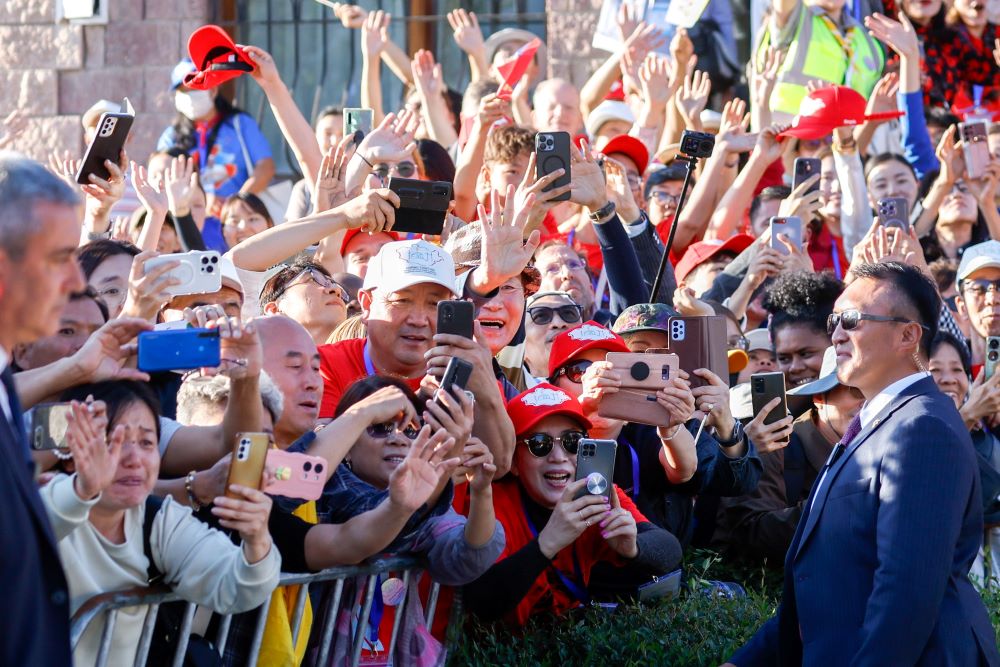
People cheer as Pope Francis leaves Sts. Peter and Paul Cathedral after meeting bishops, priests, deacons, religious, seminarians and pastoral workers in Ulaanbaatar, Mongolia, Sept. 2. (CNS/Lola Gomez)
"The church … is a poor church, sustained only by genuine faith and by the unarmed and disarming power of the risen Lord, and capable of alleviating the sufferings of wounded humanity," said Francis.
"For this reason," he continued, "governments and secular institutions have nothing to fear from the church’s work of evangelization, for she has no political agenda to advance — but is sustained by the quiet power of God’s grace and a message of mercy and truth, which is meant to promote the good of all."
Francis' Sept. 1-4 visit will continue with a morning meeting on Sept. 3 with the country's diverse interfaith leaders and a Mass for Mongolia's tiny Catholic community of less than 1,500 baptized.





